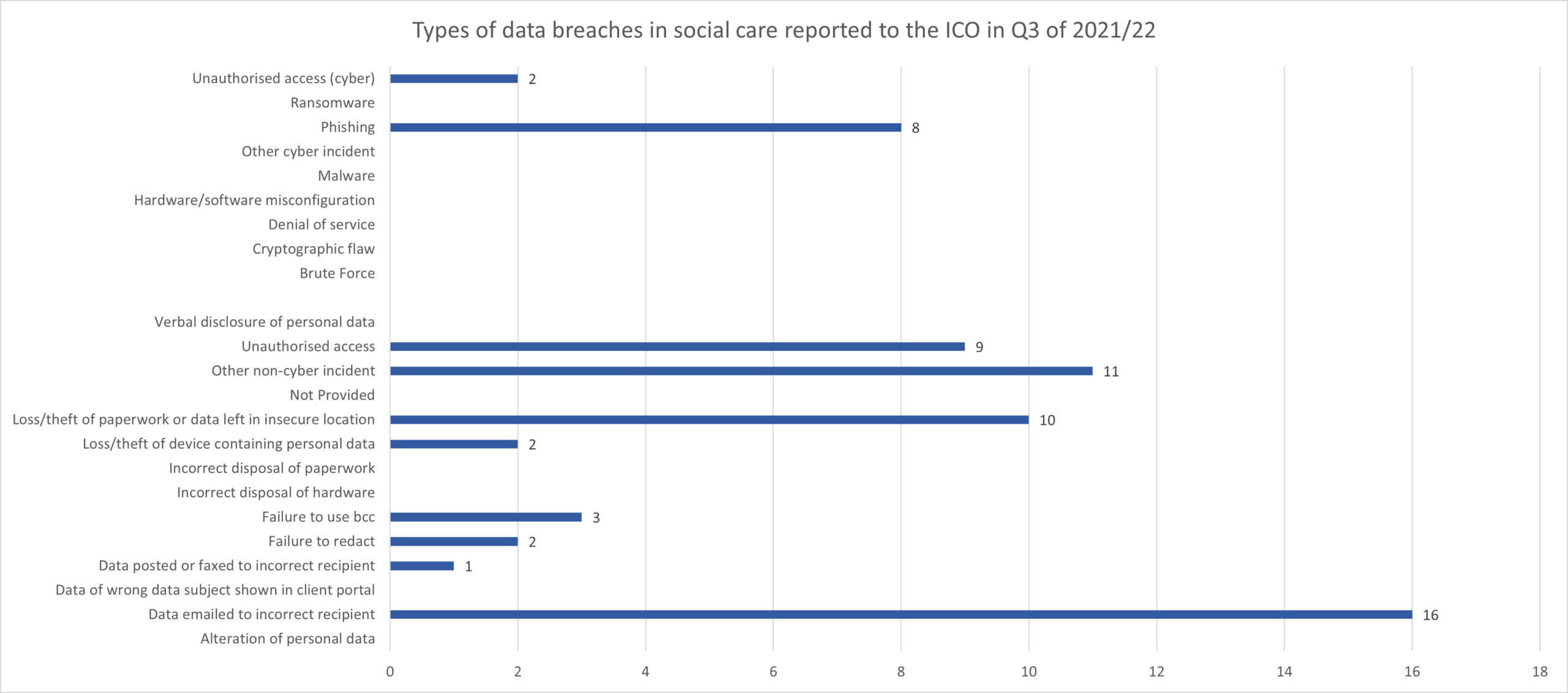Have you, or someone you know, suffered due to children in care data breaches? This article will help explore what constitutes a children in care breach and show some examples too. We will also explain what compensation you may be eligible to receive as well as the criteria needed for a No Win No Fee arrangement.

A guide on claiming for a children in care data breach
Children in care can be especially vulnerable, and data breaches can endanger them. They may have escaped from a bad living situation and need the protection a care service can offer. A data breach can impact the physical safety and mental well-being of the child, knowing that their personal information is compromised.
If you believe that a children in care data breach has compromised a child’s or your personal information, and you have a claim, speak to an advisor now for free and relevant advice. They are available 24/7 to answer questions about data breach claims. They may find your claim valid and connect you with our expert panel of No Win No Fee solicitors. Contact us today by:
- Using our live chat feature
- Calling the number at the top of the page
- Fill out our claim contact form
Choose A Section
- Guidance On Claiming Compensation For A Children In Care Data Breach
- What Is A Children In Care Data Breach?
- Examples Of Data Breaches Involving Children In Care
- How Much Could I Get For A Children In Care Data Breach?
- Criteria To Make A No Win No Fee Agreement
- Further Information About Children In Care Data Breaches
Guidance On Claiming Compensation For A Children In Care Data Breach
The UK General Data Protection Regulation (UK GDPR) is a piece of legislation that outlines, in conjunction with the Data Protection Act 2018 (DPA), data protection regulations.
Personal data is information that can identify you. For example, your name is personal information.
The UK GDPR defines a data breach as a security incident where personal data is accessed, disclosed, destroyed, lost or changed accidentally or without a lawful basis. There are two possible entities that are responsible for keeping your data safe, which include:
- Data controller – The entity that determines the purpose of processing the data.
- Data processor – An entity that might be outsourced by the controller to process the subject’s data on behalf of the controller, and in accordance with the controller’s purpose for the data.
For a child to claim for a data breach, they must have a litigation friend acting on their behalf. The Limitation Act 1980 states that a child cannot claim for themselves in certain cases; for example:
- If under 18, a litigation friend can be appointed to represent the child’s best interests and claim on their behalf until their 18th birthday.
- A litigation friend can also be appointed if the claimant lacks the mental capacity to claim for themselves, or until mental capability is regained.
Generally, those who are 18 or over have 3 years to claim.
What Is A Children In Care Data Breach?
The UK GDPR and DPA work alongside each other to ensure the security of your personal data. When the entity processing the data fails to safeguard your personal data exposing your information to those without lawful bases, you could claim.
The Information Commissioner’s Office (ICO) states that a controller or processor must have lawful reasons to process personal data. Some examples of lawful bases include:
- Consent
- Contract fulfilment
- Legal obligation
- Vital interest
- Public task
- Legitimate interest
It is important to remember that each lawful basis is equally as important as the other meaning that consent does not supersede the basis of a contract or vital interest. Contact our advisors for more information on what a children in care data breach is or read on for provided examples.
Examples Of Data Breaches Involving Children In Care
Data breaches can be cyber or non-cyber security incidents. A children in care data breach can include sensitive data relating to confidential home addresses for children escaping from abusive situations.
Personal information can fall under the ICO’s list of special category data, which can include racial or ethnic origin and genetic data.
Some examples of children in care data breaches can include:
- Phishing – The impersonation of legitimate sources, mostly through emails, to obtain personal information.
- Unauthorised access – Individuals are granted access to the personal information they shouldn’t have.
- Ransomware – A type of malware installed on a computer that encrypts information unless a ransom is paid; however, it does not guarantee that the information stolen will not be processed even if the ransom is paid.
Data Breach Figures For 2022
As previously mentioned the most common types of children in care data breaches include phishing, unauthorised access and ransomware. The below chart shows the other types of breach incidents in social care as reported in the ICO’s data security trends:

How Much Could I Get For A Children In Care Data Breach?
In successful children in care data breach claims, there are two common types of possible compensation known as material and non-material damages.
The Judicial College Guidelines (JCG) is a publication that outlines the potential payout brackets for non-material damages, which covers the mental harm and suffering inflicted due to the data breach. The amount awarded can differ depending on the level of severity of your mental health diagnosis. The following table below shows possible compensation amounts listed in the 16th edition of the JCG:
Injury Compensation Notes
Severe general mental health damage (a) £54,830 to £115,730 The injured person has marked problems with prognosis, future vulnerability, impact on relationships and the ability to cope with work, life, employment and/or education.
Severe anxiety disorder (a) £59,860 to £100,670 The injured person will be permanently affected preventing working at all or to a pre-trauma, plus all aspects of life will be detrimentally impacted.
Moderately severe general mental health damage (b) £19,070 to £54,830 Significant problems with the same factors as above, however, the injured person will have a slightly better prognosis.
Moderately severe anxiety disorder (b) £23,150 to £59,860 Professional help may aid recovery, however, PTSD may cause significant disabilities in the future.
Moderate general mental health damage (c) £5,860 to £19,070 Where the injured person may have some problems with the same above factors, there will also be a considerable improvement and the prognosis is better.
Moderate anxiety disorder (c) £8,180 to £23,150 Where there has been a large recovery and persisting effects will not be majorly disabling.
Less severe general mental health damage (d) £1,540 to £5,860 The prognosis has majorly improved and the awarded amount depends on how much daily activity and sleep are affected.
Less severe anxiety disorder (d) £3,950 to £8,180 Within one to two years the injured person will have a nearly full virtual recovery and minor symptoms will continue for longer.
Explaining Material Damage
Additionally, you may receive compensation for material damages such as compromised personal banking information. Financial information is particularly sensitive as with unlawful access, a third party can withdraw your money, impersonate your identity and apply for loans.
Contact our advisors today for more information on what compensation you may be eligible to claim as part of your children in car data breach case.
Criteria To Make A No Win No Fee Agreement
If you would like to pursue a claim with the help of a solicitor, you may want to take a No Win No Fee arrangement. Our advisors can determine whether your claim has grounds and can connect you with our panel of expert No Win No Fee lawyers.
No Win No Fee is a common term that refers to specific legal arrangements. For example, our panel of solicitors operate under a Conditional Fee Agreement (CFA) which has many advantages when making a data breach claim. Hiring a CFA lawyer costs nothing upfront and you pay none of their legal fees if your claim fails.
If your claim succeeds, a success fee, which is a legally-capped percentage, is taken from your compensation. This is only after the compensation has come through, however. You’ll also get to discuss the percentage with a solicitor from our panel before claiming.
Ask About Making A Children In Care Data Breach Claim
If your claim could help with legal guidance from our panel of CFA lawyers, get in touch today by:
- Using our live chat feature
- Calling the number at the top of the page
- Fill out our claim contact form
Further Information About Making A Children In Care Data Breach Claim
We have many other guides that you may find helpful:
How To Claim GDPR Compensation For Distress
Claim Medical Data Breach Compensation
How To Find Data Breach Claim Solicitors
Please see the other useful external links provided as well:
Contact our advisors for more information on a children in care data breach today.
Writer Jack Elliott
Publisher Ruth Voss